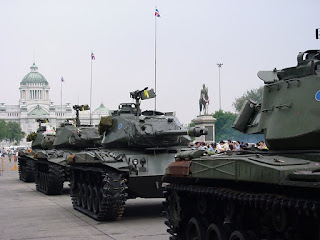
Governments, particularly the United States and British governments, have been accused of carrying out false flag coups d'état, in order to install friendly governments in foreign countries so that they can control the wealth through the central banks, resources and industries of each country. Some of these have since been acknowledged - such as Operation Ajax (1953), a covert coup to topple the democratically elected leaders of Iran. Some other coups that some believe may have been actively supported by the United States government include the following:
1911 China
1944 Bulgaria
1944 Chile
1945 Hungary
1952 South Africa, Zimbawe, mozambique, The congo, Nigeria and several others
1958 Pakistani coup d'état.
1962 Cuban-Russian attempt
1963 The Kennedy assassination (President John F. Kennedy)
1965 30 September Movement.
1968 Robert F. Kennedy assassination (presidential candidate Robert F. Kennedy).
1975 Bangladeshi coup d'état.
1977 Pakistani coup d'état.
1980 Turkish coup d'état.
1991 Haiti coup d'état.
1992 Venezuelan coup d'état attempts.
1998 Indonesian Revolution.
2000 The overthrow of Yugoslavia (Serbian) president Slobodan Milošević, see Overthrow of Slobodan Milošević.
2002 Venezuelan coup d'état attempt.
2005 Mauritania
1967 & 2009 Greece
1952 & 2011 Egypt
Here is a list in great detail of many
http://en.wikipedia.org/wiki/List_of_coups_d%27état_and_coup_attempts

Coups d'état are common in Africa; between 1952 and 2000, thirty-three countries experienced 85 such depositions. Western Africa had most of them, 42; most were against civil regimes; 27 were against military regimes; and only in five were the deposed incumbents killed.[8] Moreover, as a change-of-government method, the incidence of the coup d'état has declined worldwide, because usually, the threat of one suffices to effect the change of government; the military do not usually assume power, but install a civil leader acceptable to them. The political advantage is the appearance of legitimacy, examples are the collapse of the French Fourth Republic, and the change of government effected in Mauritania, on 3 August 2005, while the president was in Saudi Arabia.
Types of coups d'état
Breakthrough coup d'état: a revolutionary army overthrows a traditional government and creates a new bureaucratic elite. Generally led by mid level or junior officers. Examples are China in 1911, Bulgaria in 1944, Egypt in 1952, Turkey in 1960, Greece in 1967, Libya in 1969, Portugal in 1974 and Liberia in 1980
Guardian coup d'état: the "musical chairs" coup d'état. The stated aim of such a coup is usually improving public order, efficiency, and ending corruption. There usually is no fundamental change to the power structure. Generally, the leaders portray their actions as a temporary and unfortunate necessity. An early example is the coup d'état by consul Sulla, in 88 B.C., against supporters of Marius in Rome, after the latter attempted to strip him of a military command. A contemporary instance is the civilian Prime Minister of Pakistan Zulfikar Ali Bhutto's overthrow by Chief of Army Staff General Muhammad Zia-ul-Haq in 1977, who cited widespread civil disorder and impending civil war as his justification. In 1999, General Pervez Musharraf overthrew Pakistani Prime Minister Nawaz Sharif on the same grounds. Nations with guardian coups can frequently shift back and forth between civilian and military governments. Example countries include Argentina (1930 to 1983), Pakistan, Turkey(1978 and 1980), and Thailand. A bloodless coup usually arises from the Guardian coup d'état.
Veto coup d'état: occurs when the army vetoes the people's mass participation and social mobilisation in governing themselves. In such a case, the army confronts and suppresses large-scale, broad-based civil opposition, tending to repression and killing, the prime example in Marxist historiography is the coup d'état in Chile in 1973 against the elected Socialist President Salvador Allende Gossens by the Chilean military. The 20 July 1944 plot by parts of the German military to overthrow the elected National Socialist government of Adolf Hitler in Germany is an example of a failed veto coup d'état.
No comments:
Post a Comment